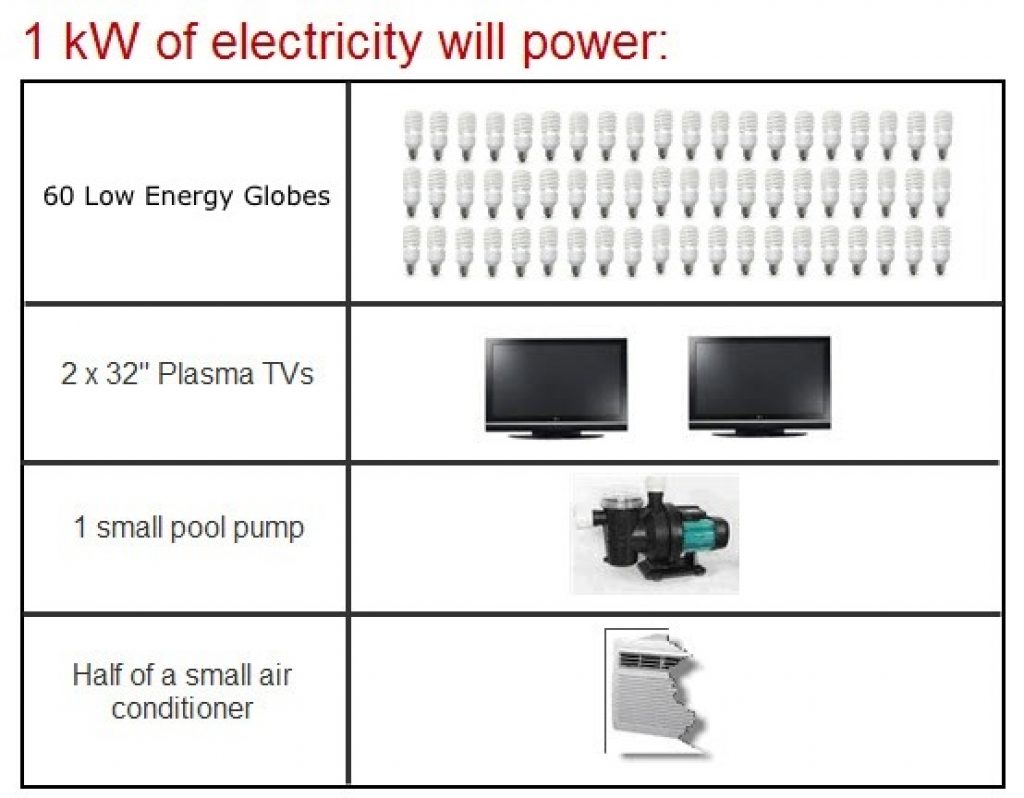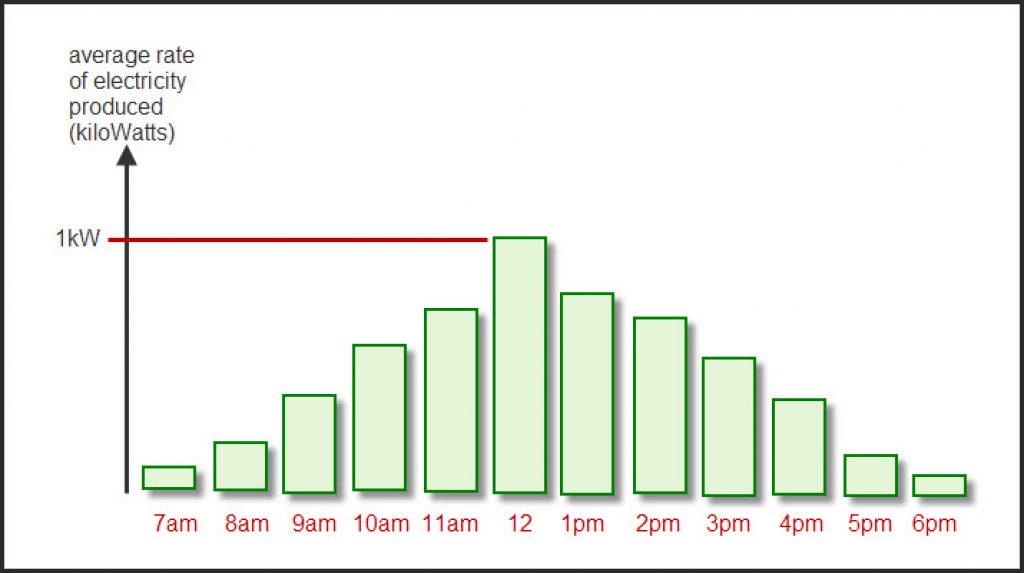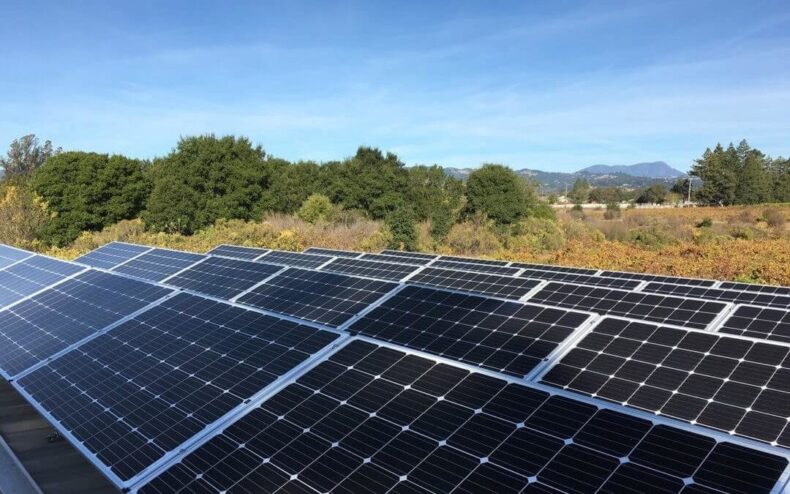The thought of including a 1 kW solar panel in your solar array must have crossed your mind more than once this year (we know it has for us). After all, we know how valuable the installation of solar panels is to your household and the planet.
Would it then not make sense to go as big as possible and buy a 1000-watt solar panel? Well, to our knowledge, single 1000-watt solar panels do not exist, at least not yet.
However, this article aims to teach you how to build your own 1 kW solar system using top-quality monocrystalline solar panels from companies such as Renogy and Eco-Worthy.
Table of Contents
1 kW Solar Panel Overview
As we’ve already mentioned, individual 1000-watt solar panels do not exist, at least not yet in 2022.
Instead, when you hear someone referring to a 1kw solar panel, they’re actually referring to a 1 kW solar system made up of multiple solar panels equaling 1000 watts.
For example, by connecting 10x 100-watt solar panels in series, you’d end up with a 1 kW solar array.
It would be best to keep this fact in mind, as 10 x 100-watt solar panels can take up quite a bit of space depending on the brand/solar panel type you use.
1 kW Solar Panel Price
The average price for a 1 kW solar panel array is between $700 to $1200 (just for the solar panels).
Below, we’ve created a table that you can use to judge the different types of 1 kW solar setups and their pricing. We’ve expressed this in $/W for better comparison.
| Solar Panel Wattage | Amount of Solar Panels | Total Wattage | Size of Each Panel | Total area for 1kw solar panel | Price Renogy | Price/Watt |
|---|---|---|---|---|---|---|
| 50 Watts | x 20 | 1kw | 558 x 508 x 25 mm | 5.67 sqm | $1,499.98 | $1.49 |
| 100 Watts | x 10 | 1kw | 1044 x 508 x 35 mm | 5.3 sqm | $999 | $0.99 |
| 200 Watts | x 5 | 1kw | 1650 x 670 x 35 mm | 5.53 sqm | $1399.95 | $1.39 |
| 320 Watts | x 4 | 1,2kw | 1666 x 1002 x 35 mm | 5.2 sqm | $1299.99 | $1.01 |
| 450 Watts | x 2 | 0.9kw | 1909 x 1134 x 35 mm | 4.81 sqm | $899.99 | $0.99 |
| 550 Watts | x 2 | 1.1kw | 2279 x 1134 x 35 mm | 4.7 sqm | $1,099.99 | $0.99 |
1 kW Solar Panel Size
As previously mentioned, a singular 1 kW solar panel does not exist; with current solar technology, that’d be one humungous solar panel!
Most Powerful Single Panel
As of May 2022, the most powerful single solar panel on the market is TrinaSolar’s 670- watt offering. Due to its large size, it’s used predominantly for utility & commercial solar PV production.
Determining Size (Example)
To determine the size of a 1 kW solar system, you’ll have to account for the combined size of all your solar panels.
In the previous table, we included each solar panel type’s size and the total area covered for a 1 kW solar system.
Let’s use the most popular solar panel wattage, the 100-watt solar panel from Renogy. Each 100-watt solar panel has the following dimensions:
1044 x 508 x 35 mm (41 x 20 x 1.4 inches)
Let’s assume you’ll create two rows of solar panels on your roof. That would mean 5 solar panels per row (to equal the 1kw or 1000-watt with 10x 100-watt solar panels).
Positioning the solar panels vertically on your roof would mean your total height (with two rows of solar panels) will be 2088 mm, and your total width (with 5 solar panels next to one another) would be 2540 mm.
The Result
The total size of this 1 kW solar panel array would be 5,3M2.
Remember that you’ll need less space with more powerful solar panels to reach 1 kW of solar power. For example, you’ll need 4.7sqm of space with 550-watt solar panels to get 1 kW, whereas, with 50-watt, you’ll need 5.67sqm.
Therefore, if you want to optimize your space on the roof of your house or in your RV, opt for more powerful solar panels. You’ll be able to produce more electricity in a smaller space and often at a lower cost.
How Many Solar Panels Are Required For 1 kW?
At first, this may seem like a super easy calculation: 1000 watts equals 1 kW. Therefore, if you have four 250-watt solar panels and connect them in series, you’ll end up with 1000 watts, or 1 kW.
However, you must remember that solar panels lose wattage as the temperature increases.
This phenomenon is usually represented as a percentage loss per degree Celsius — you’ll always find this information on the product packaging/user manual or, when buying online, in the product specifications section.
For example, the Renogy 100 W solar panel has a power loss of -0.37%/ºC, and the surface of the solar panel can reach 65°C, translating into a potential 8% power loss.
Therefore, we recommend slightly oversizing your system to compensate for the power loss at higher temperatures.
Is 1 kW Enough To Run A House?
This question is relative and depends on your home’s energy consumption and the amount of sunlight received at your location.
California Vs. New York Energy Production
For example, if you live in California (one of the sunniest states), a 1 kW solar system will produce 4.9 kWh/day, whereas if you live in New York, a 1 kW solar system will only produce 3.5 kWh/day.
Average U.S. Electricity Consumption
The average American home consumes 877 kWh a month which adds up to 29 kWh a day. Therefore, a 1 kW solar panel system is insufficient to power your average American household.
Also, remember that not every day will be sunny, there may be rain forecasted for the week, or it may be extremely overcast.
All things considered, if you consume the same amount of energy as the average American, you’ll need a more extensive solar array like this one to provide your home with enough electricity.
California Vs. New York Energy Requirements
To power a house with solar panels, in California, you’ll need 6 kW solar panels; in the state of New York, more than 8 kW.
kWh To kW (Conversion)
kWh is the standard unit used to measure a household’s energy consumption.
Here is the formula to convert kWh to kW:
The power P in kilowatts (kW) is equal to the energy E in kilowatt-hours (kWh), divided by the consumption period (t) in hours (h):
P(kW) = E(kWh) / t(h)
What Can Be Run On A 1 kW Solar Panel?
Here’s a quick infographic (you can click here for more) to give you a rough idea of what a 1 kW solar panel array is capable of powering:

At first, this seems impressive, and it is, but there are some practical points for you to consider:
For example, a 1 kW solar panel system will produce 1 kW of electricity for a few hours a day, but only when it’s a clear sunny day.
Below is a chart showcasing a 1 kW solar panel’s electricity output over a summer’s day. You can see that 1 kW is only generated at noon (when the sun is at its strongest):

If you plan to go completely off-grid, we recommend investing in a more extensive solar kit setup, such as a 3-5 kW solar panel kit.
Best 1 kW Solar Panels
Below are the best solar panels/brands to create your own 1 kW solar panel system. We provide you with single solar panels; you will need to multiply your order to build a 1 kW solar array.
Best 100 W Solar Panels For A 1kW Solar Array
RENOGY
Renogy is a leading brand in solar equipment. Their solar panels are made of the highest quality material and integrate the latest innovation. The last RENOGY 100W solar panel is extraordinarily compact so that you can produce more power in a smaller space for the next 25 years. All of that at a competitive price, below $1/W.
You will need 10 modules of 100W for a 1 kW solar array.
Best 200W Solar Panel sFor A 1kW Solar Array
WEIZE
WEIZE solar panel is constructed with high-performance monocrystalline solar cells that offer higher efficiency (up to 21%), embedded in a strong aluminum frame. It comes with a 25-year power warranty.
The company only produces small power solar panels (up to 100 W) and currently offers a great bundle of 2 x100 W solar panels; already a best seller on Amazon!
For a 1 kW solar array, you’ll need 5 bundles of Weize solar panels.
Best 250 W Solar Panels For A 1kW Solar Array
SHARP
Sharp is well known for their consumer electronic products, but they are also the pioneers of solar electricity, with 50 years of creation and innovation. The 250 W solar panel is one of their best entry models. It features a unique sleek black frame module that will enhance the beauty of your house.
Sharp also ensures that their module has a 5% positive-only power tolerance; more power for the same price!
You will need 4 x 250 W modules for a 1 kW solar array.
Best 400 W Solar Panels For A 1 kW Solar Array
Canadian Solar
Canadian Solar is on the rise! Since 2001, they have kept improving their solar panels thanks to strong R&D. They’re now known as one of the best brands in the world by being n°1 for performance/price ratio.
Their 400 W solar panel is not only very efficient thanks to the PERC technology but also aesthetically pleasing with a total black appearance.
You will need 3 x 400 W modules for a 1 kW solar array.
Best 500 W Solar Panels For A 1 kW Solar Array
Trina Solar
Trina Solar was one of the first manufacturers to introduce the large 500 W solar panel in 2020 by combining the triple-cut cells to save space and the MBB (multi bus-bar) technology from absorbing more light.
This was a breakthrough as it produces more electricity in a smaller space (compared to 5 * 100-watt solar panels). However, be sure you can accommodate this 2-meter long panel (more than 7 feet)!
You will need 2 x 500 W modules for a 1 kW solar array.
Final Thoughts
You may be feeling a little disappointed at the realization that 1 kW panels don’t exist, at least currently. But don’t count out the possibility of them ever coming into existence. After all, look at how far we’ve come with solar energy since its inception.
In the meantime, make use of the other solar panel sizes readily available on the market — there are plenty to choose from. In fact, you may find you’re better off purchasing smaller panels as your system will become more versatile; you could even save yourself some much-needed space!

